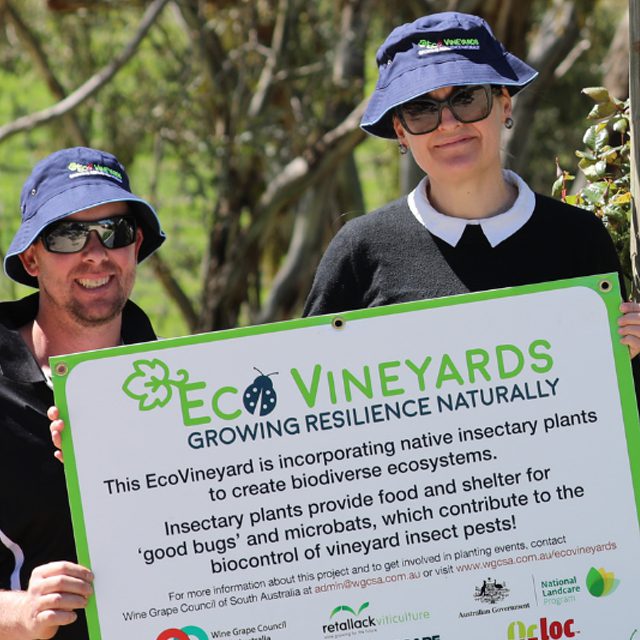1. Tell us about your experience in grape growing?
I’ve been living, working & making wine on Ngadjuri land in the Clare Valley now for 22 years and prior to that my experience in wine growing took me to Italy, France & McLaren Vale in both vineyards and wineries. As a former Clare Valley vineyard owner and Manager of Leasingham Wines with the Hardy Wine Company, I was responsible for my own 20-acre vineyard as well as overseeing some 50 different growers across the region. These vineyards ranged from young to old, large to small, conventional farming to organic/biodynamic farming and everything in between. There’s an important connection from soil to grapes to wine and I’m drawn to regenerative farming and respecting the land in which we work. I’m excited about the EcoVineyards project as a supportive layer of our vineyard management.
2. What prompted you to want to be involved in the EcoVineyards project?
I’ve been inspired by Mary’s work for some time and am also working with the Castine family (another EcoGrower group here in the Clare Valley) for my own business, Wines by KT. As mentioned, I’m drawn to regenerative farming and respecting the land in which we work and so I am excited about the EcoVineyards project as a supportive layer of our vineyard management.
The benefits for our business to be adopting these management philosophies are many but a couple of important ones being:
- Improvement of soil structure and vineyard biodiversity as a part of good quality wine growing.
- Good citizenship and responsibilities it shows in our community. I see this as taking a leadership role in our region.
3. What do you hope to achieve from your involvement in the EcoVineyards project?
Our goal is twofold. Firstly, to create a sustainable low maintenance/low water environment which will include native plants and shrubs to beautify the cellar door entrance experience. Secondly, we hope to show that by planting native grasses in the undervine and mid row areas, as well as the “beetle bank” contour, we can eliminate ground working and improve soil structure with an overall improvement of the biodiversity and health of the vineyard ecosystem.
4. Have you tried to increase biodiversity on your property before undertaking this project? If so, how?
Skillogalee has had a long-term relationship with a local apiarist with 80 – 100 bee boxes on the property at periodic times throughout the year.
5. Why do you think it is so important for growers to try and build natural resilience on their property?
Trying to be responsible landholders and custodians for future generations it is important to be caring for our special patch of dirt. We are also life proofing for future dry seasons given that we are working with largely dry grown vineyards. Social responsibility and consciousness are also important to our community and international markets.
6. Looking to the future, what do you see as a new ‘normal’ for grape growers on their properties?
We need to be ready for the severities over different seasons as we continue to experience shifts in climatic conditions.
These changes in seasons are moving towards a “normal” experience of earlier and more compact harvests. We need to be ready to protect our vineyards and support good wine growing. I see our involvement in the EcoVineyards project as a layer of support for this.

